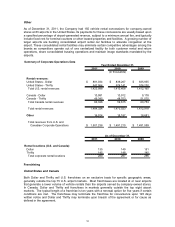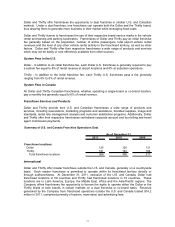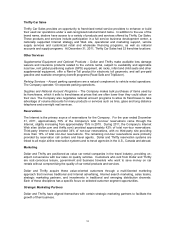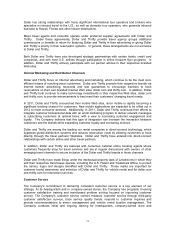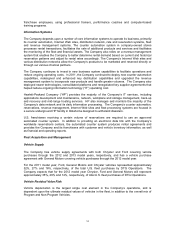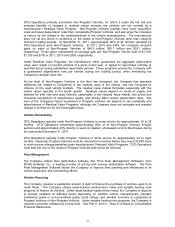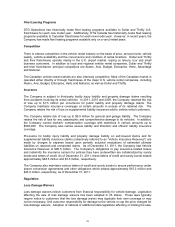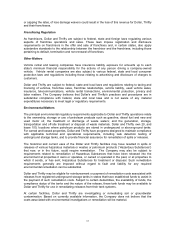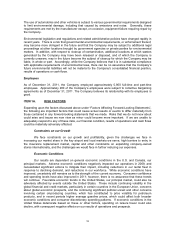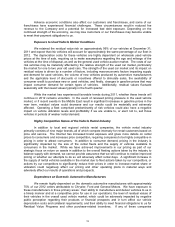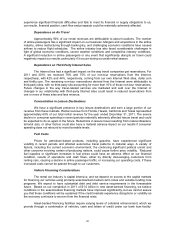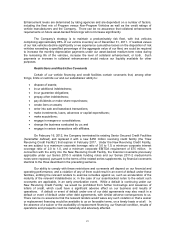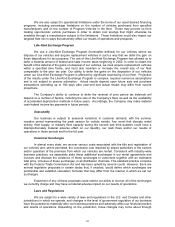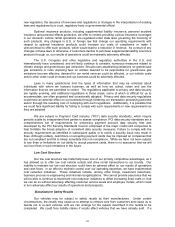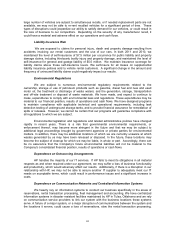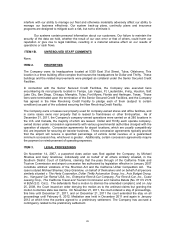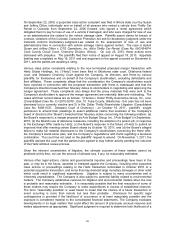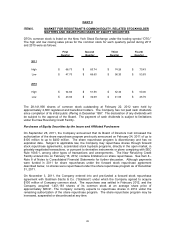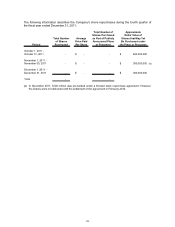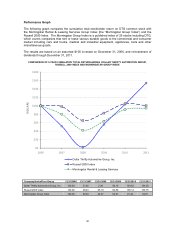Thrifty Car Rental 2011 Annual Report Download - page 22
Download and view the complete annual report
Please find page 22 of the 2011 Thrifty Car Rental annual report below. You can navigate through the pages in the report by either clicking on the pages listed below, or by using the keyword search tool below to find specific information within the annual report.experience significant financial difficulties and fails to meet its financial or supply obligations to us,
our results, financial position, cash flow and prospects could be materially adversely affected.
Dependence on Air Travel
Approximately 90% of our rental revenues are attributable to airport locations. The number
of airline passengers has a significant impact on our business. Mergers and acquisitions in the airline
industry, airline restructuring through bankruptcy, and challenging economic conditions have caused
airlines to reduce flight schedules. The airline industry has also faced considerable challenges in
light of global economic conditions, severe weather conditions and competitive industry conditions.
A significant reduction in airline passengers or any event that significantly disrupts air travel could
negatively impact our results, particularly if it occurs during our peak rental season.
Dependence on Third-Party Internet Sales
The Internet has had a significant impact on the way travel companies get reservations. For
2011 and 2010, we received 76% and 75% of our non-tour reservations from the Internet,
respectively, with 42% and 44%, respectively, coming from our own Internet Web sites, dollar.com
and thrifty.com. The remaining non-tour reservations derived from the Internet were attributable to
third-party sites, with no third-party site accounting for more than 10% of those non-tour reservations.
Future changes in the way travel-related services are marketed and sold over the Internet or
changes in our relationship with third-party Internet sites could result in reduced reservations from
one or more of these sites and less revenue.
Concentration in Leisure Destinations
We have a significant presence in key leisure destinations and earn a large portion of our
revenue from these markets. Rental revenue from Florida, Hawaii, California and Texas represented
approximately 60% of our total rental revenue for the year ended December 31, 2011. The severe
decline in consumer spending in recent periods materially adversely affected leisure travel and could
be expected to do so again in the future. Reductions in leisure travel resulting from natural disasters,
terrorist acts, or other factors could also have a material adverse impact on our results if consumer
spending does not rebound to more favorable levels.
Fuel Costs
Prices for petroleum-based products, including gasoline, have experienced significant
volatility in recent periods and affected automotive travel patterns in material ways. A variety of
factors, including the current economic environment, the continuing significant political unrest and
other concerns involving certain oil-producing nations, could cause further price volatility. Reduced
fuel supplies or significant increases in fuel prices could have an adverse effect on our financial
condition, results of operations and cash flows, either by directly discouraging customers from
renting cars, causing a decline in airline passenger traffic, or increasing our operating costs, if these
increased costs cannot be passed through to our customers.
Vehicle Financing Considerations
The rental car industry is capital intensive, and we depend on access to the capital markets
for financing our vehicles using primarily asset-backed medium-term notes and variable funding note
programs. We expect to have substantial debt and debt service requirements in the foreseeable
future. Based on our completion in 2011 of $1.5 billion in new asset-backed financing, we believe
conditions in the asset-backed financing markets have improved significantly, but we cannot assure
you that these conditions will be sustained if the credit markets experience disruptions or volatility as
the economy continues to recover from the financial crisis.
Asset-backed financing facilities require varying levels of collateral enhancement, which we
provide through a combination of vehicles, cash and letters of credit under our bank loan facility.
20


